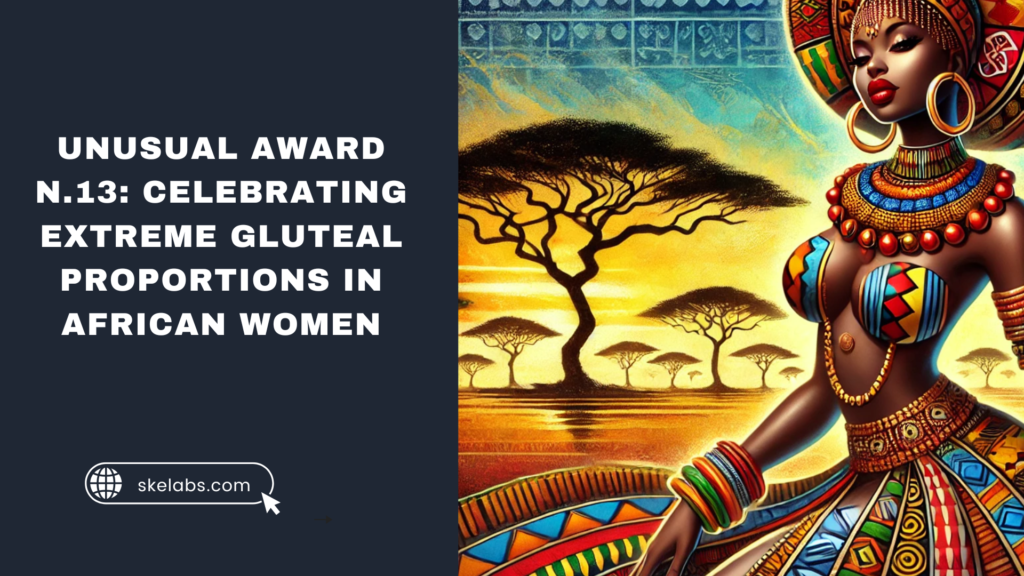Introduction: The Beauty of Diversity
In a world where beauty standards are ever-evolving, the celebration of unique physical traits has become a beacon of empowerment and cultural appreciation. Among these fascinating recognitions is the Unusual Award N.13, which honors women with extreme gluteal proportions—an exceptional feature celebrated in many African cultures.
This award not only acknowledges individuality but also shines a spotlight on the cultural, historical, and scientific significance of such traits. But what lies behind this recognition, and why does it matter in today’s global context?
The Cultural Significance of Extreme Gluteal Proportions
Have extreme gluteal proportions always been celebrated in Africa?
The answer lies in centuries of African tradition. For many ethnic groups across the continent, curvaceous figures symbolize fertility, health, and prosperity. Traits like wide hips and prominent buttocks were seen as markers of beauty, strength, and the ability to bear children—attributes deeply valued in traditional societies.
In some regions, artistic depictions, such as sculptures and carvings, emphasize these traits as a standard of beauty. The Khoisan women of Southern Africa, for example, exhibit a genetic condition called steatopygia, where fat is stored in the buttocks, a trait revered within their communities for its evolutionary significance.
The Science Behind Extreme Gluteal Proportions
Why do some women have extreme gluteal proportions?
From a scientific perspective, extreme gluteal proportions result from a combination of genetics, diet, and environmental factors. Steatopygia, a term used to describe this unique body shape, is common among certain African ethnic groups. This genetic trait evolved as an adaptation to store fat for survival in harsh climates, where food resources were scarce.
Moreover, these proportions are not merely aesthetic. Research suggests that a higher fat concentration in specific areas, such as the buttocks, provides energy reserves for pregnancy and lactation, offering a survival advantage.
This natural adaptation challenges modern beauty ideals and highlights the diversity of body shapes across cultures.
Modern Representation: From Tradition to Global Recognition
How are African women with extreme gluteal proportions perceived today?
With globalization and the rise of social media, African beauty standards have gained visibility, influencing global perceptions of body image. Curvaceous figures, often associated with African women, are now celebrated worldwide, with many influencers and celebrities embracing this aesthetic.
Figures like Kim Kardashian and Beyoncé, who have popularized curvy body types, have drawn attention to these traits, albeit with debates about cultural appropriation. Yet, for African women, this global recognition often feels like a reclaiming of what has always been their cultural pride.
The Unusual Award N.13 celebrates this very notion, honoring women whose bodies reflect a heritage of beauty, resilience, and individuality.
The Unusual Award N.13: A Unique Celebration
What makes this award special?
The Unusual Award N.13 is part of a broader initiative to celebrate extraordinary human traits. Unlike traditional beauty contests, this award highlights uniqueness over conformity. Recipients of the award are chosen not just for their physical traits but also for their confidence and the cultural stories they embody.
Through this award, women with extreme gluteal proportions are celebrated as symbols of diversity and empowerment, redefining global beauty standards.
The Debate: Empowering or Objectifying?
Does celebrating extreme physical traits empower women or reinforce stereotypes?
This question has sparked considerable debate. On one hand, the award is seen as empowering—it celebrates individuality, challenges narrow beauty ideals, and promotes body positivity.
On the other hand, some critics argue that focusing on physical traits risks objectifying women and reducing them to their appearance. Feminist scholars emphasize the importance of context: when such traits are celebrated within a cultural and historical framework, they can foster pride and identity.
Ultimately, the award’s impact lies in how it is perceived—whether as a celebration of diversity or a reinforcement of stereotypes.
The Broader Implications of Recognizing Diversity
How does this award shape conversations about global beauty standards?
By honoring women with extreme gluteal proportions, the Unusual Award N.13 opens the door to a broader conversation about inclusivity and the celebration of body diversity.
In a world where Eurocentric beauty standards have dominated for decades, recognizing traits unique to African women challenges these norms and promotes a more inclusive view of beauty.
It also sends a powerful message: beauty is not one-size-fits-all. Instead, it is a reflection of cultural, historical, and personal identity.
FAQs
1. Why is this award called “Unusual Award N.13”?
The award is part of a series that celebrates extraordinary traits, with each number representing a unique category of recognition.
2. Are there other awards celebrating unique body traits?
Yes, various awards worldwide recognize distinctive physical features, from tallest individuals to rare genetic conditions, fostering appreciation for human diversity.
3. How does this award impact perceptions of African beauty globally?
By highlighting traits celebrated in African culture, the award elevates African beauty standards on a global stage, challenging stereotypes and fostering inclusivity.
Conclusion: Celebrating the Uniqueness of Humanity
The Unusual Award N.13 is more than just a recognition of physical traits—it is a celebration of cultural heritage, individuality, and the beauty of human diversity.
In a world striving for inclusivity, awards like these remind us of the value of embracing what makes each person unique. As society continues to challenge narrow definitions of beauty, such celebrations pave the way for a future where diversity is not just acknowledged but celebrated wholeheartedly.
